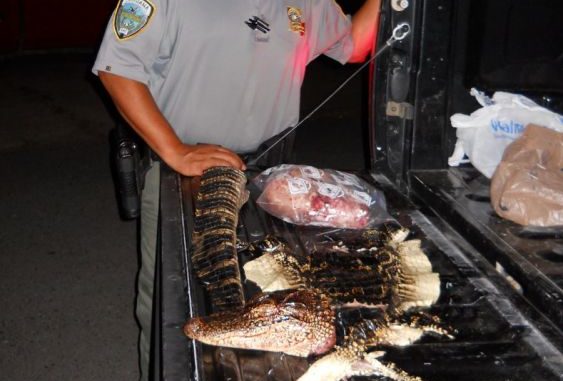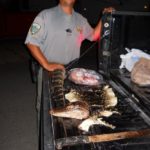
Tipster program effective tool for LDWF’s enforcement division
In the late 70s, some of the western states began establishing reward programs for information leading to the arrest of fish and wildlife violators. One of the original names for the programs was Operation Game Thief (OGT). The idea worked, and similar programs were established in a majority of states by the early to mid-80s.
In 1984, Louisiana Operation Game Thief, Inc. (LOGT) was formed and started paying out rewards. Funds contributed by generous conservation organizations, companies and individual sportsmen were the initial source of the cash. Over time, other funding mechanisms have been implemented, but more on that later.
LOGT members and its board of directors are private citizens who donate their time, money and efforts to raising funds used for rewards, determining the amount paid for the information provided and transferring the money to the Louisiana Department of Wildlife and Fisheries’ law enforcement division for payment to tipsters. They meet quarterly to perform these functions, and other duties necessary for the health and wellbeing of the organization.
I served as the enforcement division’s LOGT coordinator for 27 years. The job involved meeting with the board of directors to report on enforcement activities, presenting cases for reward consideration and routing reward money to tipsters.
LOGT guarantees anyone providing information anonymity. At times, this wasn’t easy. Some tipsters were so fearful of having their identity revealed they would not meet with local wildlife agents or anyone else who might recognize them. In some instances it was necessary for me to travel to a pre-arranged meeting location to deliver a cash reward. Needless to say, I met with some interesting characters.
“Meet me under the red horse”
On one occasion, I was to meet with a young man who had provided a wealth of detailed and accurate information which lead to the arrest of a serious poacher. The plan was to call from a pay phone (there were no cell phones back in those days) when I arrived in his very small hometown to deliver the cash.
He answered the phone and asked where I was. I told him, and he asked if I could see the sign with the red horse on it. I looked across the street at the old Mobil service station with its running red steed logo displayed proudly on a pole near the street, and assured him I could see it.
“Meet me under the red horse,” he said and hung up. He arrived a few minutes later, got out of his truck and came over to shake hands and receive the money. He then explained how sorry he was that I could not be invited to his home, but the guy he had turned in was there visiting and they were drinking beer.
I told him it was totally understandable — and got out of town.
In another case I had a roadside meeting set up with a female tipster. She earned her reward by providing information that placed wildlife agents at the perfect place and time to arrest a night hunter who had been busy reducing the local deer herd with little regard for “no trespassing” signs. We met on a sunny afternoon and the attractive young lady got out of her vehicle and walked over to accept the cash. She counted it, smiled and said “The no-good %#!@ is my ex. I’d turn him in for free, but getting paid makes it that much sweeter.”
Hell hath no fury ….
I include money in my short list of three reasons someone will turn in a violator. The other two are revenge, and elimination of competition for the resource. The last two may be more personal, but money is still in the top three — which is why reward programs like LOGT are so effective.
But as members of any non-profit conservation organization will tell you, fundraising is becoming very difficult. One reason is lack of recruitment and continued membership. Throughout the 80s and 90s, conservation organizations such as the National Wild Turkey Federation and Louisiana Wildlife Federation had throngs of members. And LOGT enjoyed their support in the form of financial donations to the reward fund. But nowadays it does not take long to call the roll at any conservation group meeting. Interest has waned as hunters age and numbers decline.
Looking forward
But LOGT has received some assistance in resolving funding issues. One has been in the courts in the form of innovative sentencing. Some Louisiana Judicial District Courts and US District Courts have ordered convicted offenders to donate money to LOGT as a condition of probation. District attorneys have taken similar action, and required mandatory donations to LOGT as part of a pre-trial intervention process. Avoyelles Parish District Attorney Charles Riddle is a leading proponent of such intervention requirements.
LOGT’s founders and members provide a very useful and effective weapon in the fight against wildlife violators. They are wildlife’s best friend, not to mention the wildlife enforcement agent’s biggest supporter.




